
Benjamin Franklin was an American polymath, a leading writer, scientist, inventor, statesman, diplomat, printer, publisher, and political philosopher. Among the most influential intellectuals of his time, Franklin was one of the Founding Fathers of the United States; a drafter and signer of the Declaration of Independence; and the first postmaster general.

William Bradford was an early American colonial printer and publisher in British America. Bradford is best known for establishing the first printing press in the Middle colonies of the Thirteen Colonies, founding the first press in Pennsylvania in 1685 and the first press in New York in 1693. Bradford operated continuously printing establishments for sixty-two years, heading a family that would include printers and publishers for 140 years. He was also known for controversies regarding freedom of the press. Starting his printing career in London, Bradford emigrated to America in 1685. He established, with others, the first paper mill to appear in the Thirteen American Colonies.

Andrew Bradford was an early American printer in colonial Philadelphia. He published the first newspaper in Philadelphia, The American Weekly Mercury, beginning in 1719, as well as the first magazine in America in 1741.
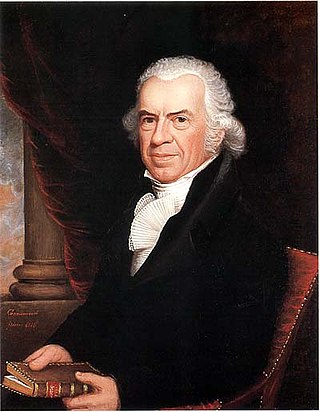
Isaiah Thomas was an early American printer, newspaper publisher and author. He performed the first public reading of the Declaration of Independence in Worcester, Massachusetts, and reported the first account of the Battles of Lexington and Concord. He was the founder of the American Antiquarian Society.

The Pennsylvania Gazette was one of the United States' most prominent newspapers from 1728 until 1800. In the years leading up to the American Revolution, the newspaper served as a voice for colonial opposition to British colonial rule, especially to the Stamp Act and the Townshend Acts. The newspaper was headquartered in Philadelphia.
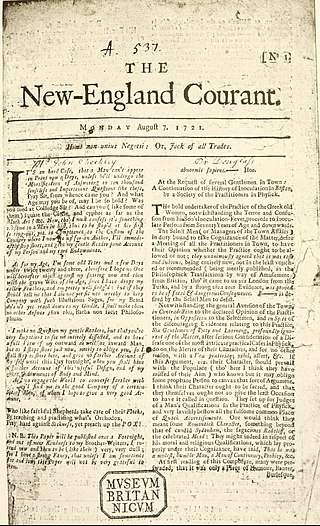
The New-England Courant, one of the first American newspapers, was founded in Boston in 1721, by James Franklin. It was a weekly newspaper and the third to appear in Boston. Unlike other newspapers, it offered a more critical account about the British colonial government and other royal figures of authority. The newspaper published critical commentary about smallpox inoculation which fueled the controversy during the smallpox epidemic in Boston. Ultimately it was suppressed in 1726 by British colonial authorities for printing what they considered seditious articles. Franklin took on his brother, Benjamin Franklin, as an apprentice and at one point was compelled to sign over publication of the Courant to him to avert further prosecution. Benjamin submitted anonymous editorials to the Courant, which resulted in James' imprisonment after he began publishing them. This sort of Governmental censorship of early colonial newspapers is what largely fostered the American ideal of Freedom of Speech in the press. The New England Courant is widely noted among historians as being the first newspaper to publish Benjamin's writings.
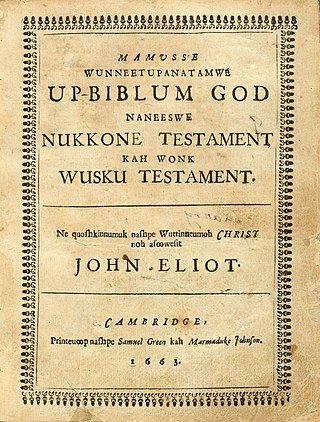
Samuel Green was an early American printer, the first of several printers from the Green family who followed in his footsteps. One of Green's major accomplishments as a printer was the Eliot Indian Bible, translated by the missionary John Eliot, typeset by James Printer, which became the first Bible to be printed in British America in 1663. Members of his family who also became printers include his sons Bartholomew, Bartholomew Green Jr. and Joseph Dennie. Throughout his adult life Green also served in the Massachusetts Bay Colonial Militia, advancing to the rank of captain later in life.

William Goddard was an early American patriot, publisher, printer and postal inspector. Born in New London, Connecticut, Goddard lived through the American Revolutionary era, during which he opposed British rule of the colonies through his actions and publications. He was a major figure in the development of the colonial postal system, which became the U.S. Post Office after the American Revolution.

The Pennsylvania Chronicle and Universal Advertiser was an American colonial newspaper founded in 1767 that was published in Philadelphia, Pennsylvania, prior to the American Revolution and was founded by William Goddard and his silent business partners Joseph Galloway and Thomas Wharton. Benjamin Franklin, an associate of Galloway, was also a partner with the Chronicle.

Samuel Kneeland (c.1696–1769) was an American printer and publisher of The Boston Gazette and Weekly Journal. Kneeland obtained much of his work printing laws and other official documents for the Province of Massachusetts Bay colonial government for about two decades. He printed the first Bible in the English language ever produced in the American colonies, along with many other religious and spiritual works, including the Book of Psalms. He was also noted for introducing a number of innovations to newspaper printing and journalism. He was one of many colonial printers who were strongly opposed to and outspoken against the Stamp Act in 1765. Kneeland, primarily, along with his sons, were responsible for printing the greater majority of books, magazines and pamphlets published in Boston during his lifetime.

William Parks was an 18th-century printer and journalist in England and Colonial America. He was the first printer in Maryland authorized as the official printer for the colonial government. He published the first newspaper in the Southern American colonies, the Maryland Gazette. He later became authorized as the official printer for the colonial government of Virginia. Parks was also the publisher and printer of the first official collection of the authentic 1733 set of Virginia's laws, and the first colonial publisher and proprietor of The Virginia Gazette newspaper. During his lifetime Parks established four new newspapers in the colonies. He also worked with Benjamin Franklin on several projects related to printing, most notably, the establishment of a paper mill in Virginia, the first such mill south of Pennsylvania.
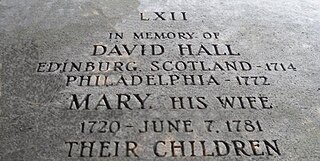
David Hall was a British printer who immigrated from Scotland to America and became an early American printer, publisher and business partner with Benjamin Franklin in Philadelphia. He eventually took over Franklin's printing business of producing official documents for the colonial province of Pennsylvania and that of publishing The Pennsylvania Gazette newspaper that Franklin had acquired in 1729. Hall formed his own printing firm in 1766 and formed partnership firms with others. He published material for the colonial government.

Early American publishers and printers played a central role in the social, religious, political and commercial development of the Thirteen Colonies in British America prior to and during the American Revolution and the ensuing American Revolutionary War that established American independence.
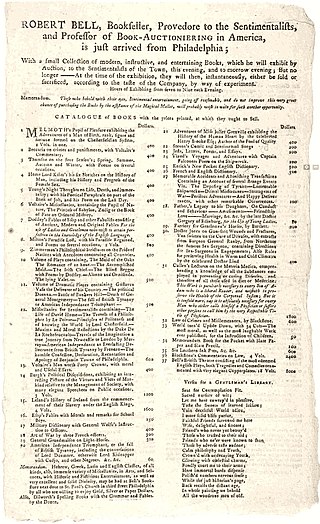
Robert Bell (1732–1784) was a Scottish immigrant to the British colonies in America and became one of many early American printers and publishers active during the years leading up to and through the American Revolution. Bell became widely noted for printing Thomas Paine's celebrated work, Common Sense, a highly influential work during the revolution that openly criticized the British Parliament and their management and taxation of the British-American colonies. Bell and Paine later had a falling out over profits and publication issues. As a dedicated patriot, Bell printed many pamphlets and books before and during the revolution, many of which "glowingly" expressed his patriotic views. He also reprinted a number of popular English works, presenting them to the colonies for the first time. He ran an auction house which sold rare books in Lancaster, and in later life he toured the colonies selling off his massive book collection. After Bell's death, his printing press and other items were sold at a Philadelphia auction house to another prominent printer at an unusually high price.

The Constitutional Courant was a single issue colonial American-newspaper published in response to the Stamp Act of 1765. It was printed by William Goddard under an assumed name of Andrew Marvel. The newspaper vociferously attacked the Stamp Act in strong language, which caught the attention of colonial printers and royal colonial officials alike. The Courant and its general message proved popular and the newspaper was soon reprinted in other major towns and distributed elsewhere among the colonies.

Andrew Barclay (1737–1823) was a Scottish bookbinder who emigrated from Kinross, Fifeshire, to Boston in the British-American colonies in the mid-eighteenth century. As the American Revolutionary War drew near, Barclay sided with the Loyalists and was compelled to leave Boston when the British were driven out in March 1776. Upon leaving Boston he was assigned a command in charge of getting Loyalist refugees out of Boston to Nova Scotia. Soon after, he continued his trade in British-occupied New York for the duration of the war. Bookbinder's trade labels like Barclay's, found on the inside cover of some of his works, are considered a rarity among books printed in colonial America.

The Papers of Benjamin Franklin is a collaborative effort by a team of scholars at Yale University, American Philosophical Society and others who have searched, collected, edited, and published the numerous letters from and to Benjamin Franklin, and other works, especially those involved with the American Revolutionary period and thereafter. The publication of Franklin's papers has been an ongoing production since its first issue in 1959, and is expected to reach nearly fifty volumes, with more than forty volumes completed as of 2022. The costly project was made possible from donations by the American Philosophical Association and Life magazine.

This is a comprehensive list of primary and secondary works by or about Benjamin Franklin, one of the principal Founding Fathers of the United States. Works about Franklin have been consistently published during and after Franklin's life, spanning four centuries, and continue to appear in present-day publications. Scholarly works that are not necessarily subject-specific to Franklin, yet cover his life and efforts in significant measure, may also be included here. In contrast, this bibliography does not include the numerous encyclopedia articles and short essays about Franklin..
Samuel Hall (1740-1807), was an Early American publisher and printer, newspaper editor, and an ardent colonial American patriot from Bedford, Massachusetts who was active in this capacity before and during the American Revolution, often printing newspapers and pamphlets in support of American independence. Hall was the founder of The Essex Gazette, the first newspaper published in Salem, Massachusetts in 1768. He often employed his newspaper as a voice supporting colonial grievances over taxation and other actions by the British Parliament that were considered oppressive, and ultimately in support of American independence.
Marmaduke Johnson was a London printer who was commissioned and sailed from England to Massachusetts Bay Colony in 1660 to assist Samuel Green in the printing of The Indian Bible, which had been laboriously translated by John Eliot into the Massachusett Indian language, which became the first Bible printed in America. Johnson is considered the first master printer to emerge in America. When he attempted to operate his own privately owned printing house in Boston, without an official license from the Crown, the Massachusetts General Court interceded and censured his operation, which in turn started one of the first 'Freedom of the Press' issues in colonial America. After several appeals the Court conceded, where Johnson moved to Boston, set up and outfitted his printing shop, and ultimately became the first printer in America allowed to operate his own private printing press. During his printing career, Johnson printed several works for Eliot containing religious material translated for the Indian nations of Massachusetts.


















